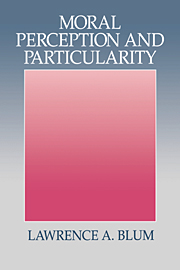Book contents
- Frontmatter
- Contents
- Acknowledgments
- PART I PARTICULARITY
- PART II MORAL EXCELLENCE
- 4 Moral exemplars: reflections on Schindler, the Trocmés, and others
- 5 Vocation, friendship, and community: limitations of the personal-impersonal framework
- 6 Altruism and the moral value of rescue: resisting persecution, racism, and genocide
- 7 Virtue and community
- PART III THE MORALITY OF CARE
- Index
6 - Altruism and the moral value of rescue: resisting persecution, racism, and genocide
Published online by Cambridge University Press: 12 January 2010
- Frontmatter
- Contents
- Acknowledgments
- PART I PARTICULARITY
- PART II MORAL EXCELLENCE
- 4 Moral exemplars: reflections on Schindler, the Trocmés, and others
- 5 Vocation, friendship, and community: limitations of the personal-impersonal framework
- 6 Altruism and the moral value of rescue: resisting persecution, racism, and genocide
- 7 Virtue and community
- PART III THE MORALITY OF CARE
- Index
Summary
Samuel and Pearl Oliner's book The Altruistic Personality elicits our great admiration and gratitude for the few who risked so much to shelter Jews in Nazi Europe. This work is of the first importance for moral philosophers concerned to understand the highest reaches of moral excellence. No firm line can be drawn between psychology and philosophy in this area. Both attempt to understand what it is to be a person of heroic virtue, such as the individuals studied by the Oliners; and this quest cannot be severed from the attempt to understand how we can become, and help others become, morally excellent, or at least morally better. The Oliners suggest that the rescuers they studied had “altruistic personalities” and that by studying their histories we can learn how to promote altruism in others. I will claim that the concept of altruism by itself is insufficient to express the moral accomplishment of these rescuers. I will argue that there are other moral values implicated in such rescue activities that supplement and enrich–but are distinct from–the value of altruism per se. First is the moral value of resistance to evil. Acts of rescue constituted resistance to Nazism, specifically resistance to both persecution and racism, in addition to being acts of altruism. Second is the value of resistance to genocide, which implies a positive value being placed on the existence of the Jewish people as a people (over and above the value embodied in altruism, of saving individual Jews).
- Type
- Chapter
- Information
- Moral Perception and Particularity , pp. 124 - 143Publisher: Cambridge University PressPrint publication year: 1994
- 1
- Cited by



